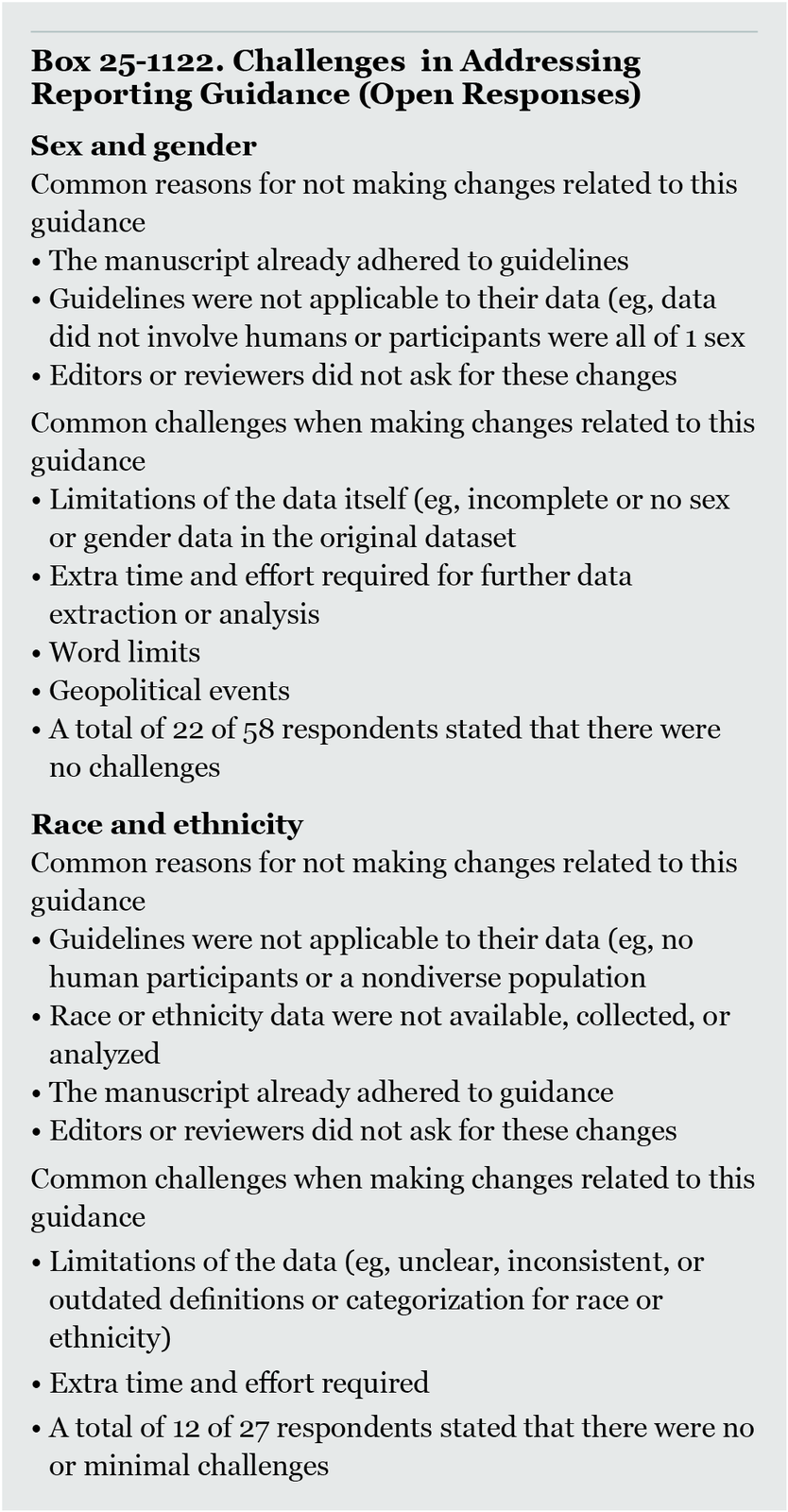Author Responses to Editorial Guidance on Reporting of Sex, Gender, Race, and Ethnicity Data
Abstract
Mabel Chew,1 Taissa Vila,2 Jashelle Caga-Meller,3 Zoë Mullan,4 Diana Samuel5
Objective
As part of The Lancet Group’s commitment to advancing equity, diversity, and inclusion, we implemented the Sex and Gender Equity in Research (SAGER) guidelines1 in 2023, and The Lancet guidance on reporting race and ethnicity2 in June 2024 across 24 Lancet Group journals. Although data exist on the reporting of race and ethnicity in published articles after similar guidelines were launched,3 less is known about how authors view and engage with guidelines, which is crucial to implementing and refining editorial policy. Thus, we aimed to examine authors’ awareness of and responses to these guidelines and identify challenges to guideline implementation.
Design
Corresponding authors of research or review articles submitted to a Lancet journal, who had received a request for revision between July and December 2024, were invited to participate in an online survey in January 2025. The survey asked authors about their awareness of the guidelines, changes they made to their manuscripts in response to editorial advice, the ease with which they made those changes, any challenges encountered, and how these guidelines might influence their next project.
Results
The survey response rate was 22% (484 of 2185 invitations). The largest proportion of respondents was from the US (68 [14%]), followed by China (65 [13%]), the UK (59 [12%]), Australia (30 [6%]), the Netherlands (27 [6%]), Germany (21 [4%]), Canada (19 [4%]), and Sweden (17 [4%]). Fifty-four percent identified as a man (n=262), 41% as a woman (n=197), 1% as non-binary or gender diverse (n=5), and 4% preferred not to say (n=20); (64%) were involved in research and/or development, and 191 (40%) were senior researchers or in middle management. Of the 484 respondents, 193 (40%) and 220 (46%) were aware of the sex and gender and race and ethnicity reporting guidelines before submitting, respectively. A total of 246 respondents (51%) and 266 (55%), respectively, were not required to collect these data, and 9 (2%) and 33 (7%) were not permitted to collect these data. Among 153 respondents (32%) who amended their manuscript as a result of the sex and gender guidance, 104 found this easy or very easy to do. Fewer respondents (90 [19%]) made changes in response to the race and ethnicity guidance, with 55 finding this easy or very easy. Box 25-1122 includes open-text responses on challenges in addressing these guidelines. Approximately one-half of respondents said they were likely or very likely to do things differently in their next project as a result of these guidelines (255 [53%] and 221 [46%] for each guidance, respectively).

Conclusions
Less than one-half of the authors surveyed reported awareness of sex and gender or race and ethnicity reporting guidelines before submission, suggesting that increasing awareness could enhance engagement. Most authors who amended their manuscript in response to these guidelines found this to be easy. The challenges identified provide opportunities for journals to refine editorial processes.
References
1. Heidari S, Babor TF, De Castro P, Tort S, Curno M. Sex and gender equity in research: rationale for the SAGER guidelines and recommended use. Res Integr Peer Rev. 2016;1:2. doi:10.1186/s41073-016-0007-6
2. Chew M, Samuel D, Mullan Z, Kleinert S; Lancet Group for Racial Equity (GRACE). The Lancet Group’s new guidance to authors on reporting race and ethnicity. Lancet. 2024;403(10442):2360-2361. doi:10.1016/S0140-6736(24)01081-X
3. Flanagin A, Cintron MY, Christiansen SL, et al. Comparison of reporting race and ethnicity in medical journals before and after implementation of reporting guidance, 2019-2022. JAMA Netw Open. 2023;6(3):e231706. doi:10.1001/jamanetworkopen.2023.1706
1The Lancet, Elsevier Australia, Chatswood, Sydney, Australia, mabel.chew@lancet.com; 2The Lancet Regional Health—Americas, Rio de Janeiro, Brazil; 3The Lancet Regional Health—Western Pacific, Sydney, Australia; 4The Lancet Global Health London, UK; 5The Lancet Digital Health, London, UK.
Conflict of Interest Disclosures
Mabel Chew is a member and former co-chair of The Lancet Group for Racial Equity and has received funding for conference travel expenses from the World Conference on Research Integrity, Committee on Publication Ethics, and Nuffield Department of Primary Care Health Sciences. Taissa Vila is co-chair of and a member of The Lancet Group for Racial Equity. Jashelle Caga-Meller is honorary clinical senior lecturer at the Faculty of Medicine and Health, University of Sydney, Australia, and a member of The Lancet Group for Racial Equity. Diana Samuel is a member and former co-chair of The Lancet Group for Racial Equity, and a member and former Chair of the European Association of Science Editors’ (EASE) EDI Committee.
Acknowledgments
We thank all authors who responded to the survey; Marco Conforti for database support; Louise Hall and Adrian Mulligan for their help in conducting the survey and in preliminary reporting and analysis; Pooja Jha, Rupa Sarkar, Lan-Lan Smith, Richard Horton, and members of the Lancet’s Group for Racial Equity (GRacE) for advice and support.
